Book3 Unit 7 The Sea Lesson 1 The Spirit of Explorers(共69张PPT)
文档属性
| 名称 | Book3 Unit 7 The Sea Lesson 1 The Spirit of Explorers(共69张PPT) | 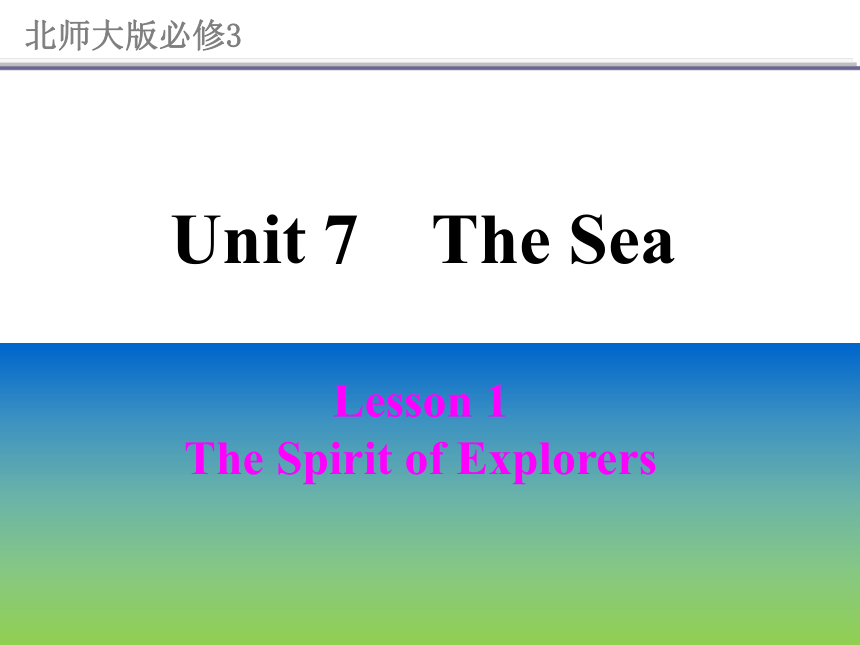 | |
| 格式 | zip | ||
| 文件大小 | 9.8MB | ||
| 资源类型 | 教案 | ||
| 版本资源 | 北师大版 | ||
| 科目 | 英语 | ||
| 更新时间 | 2016-03-05 10:27:26 | ||
图片预览

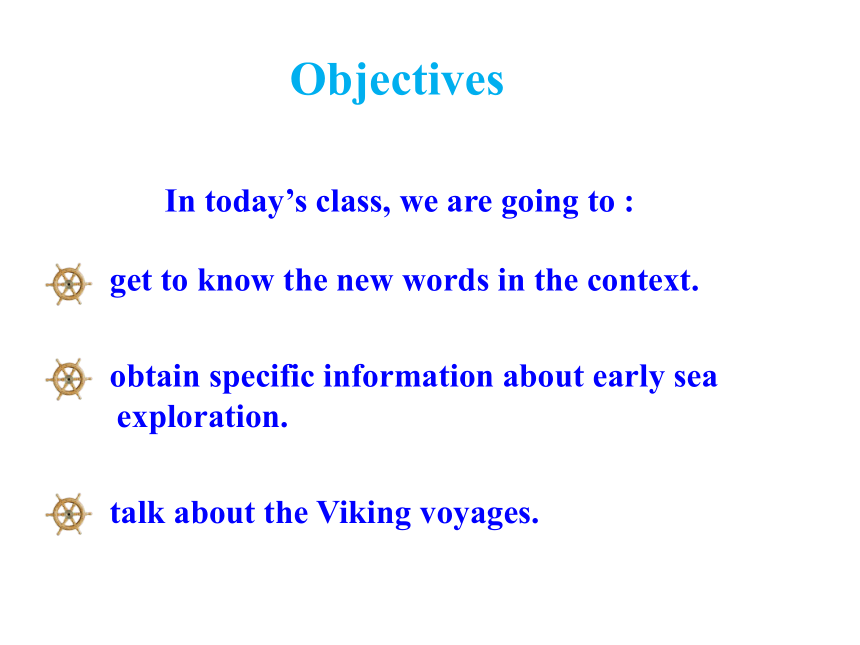
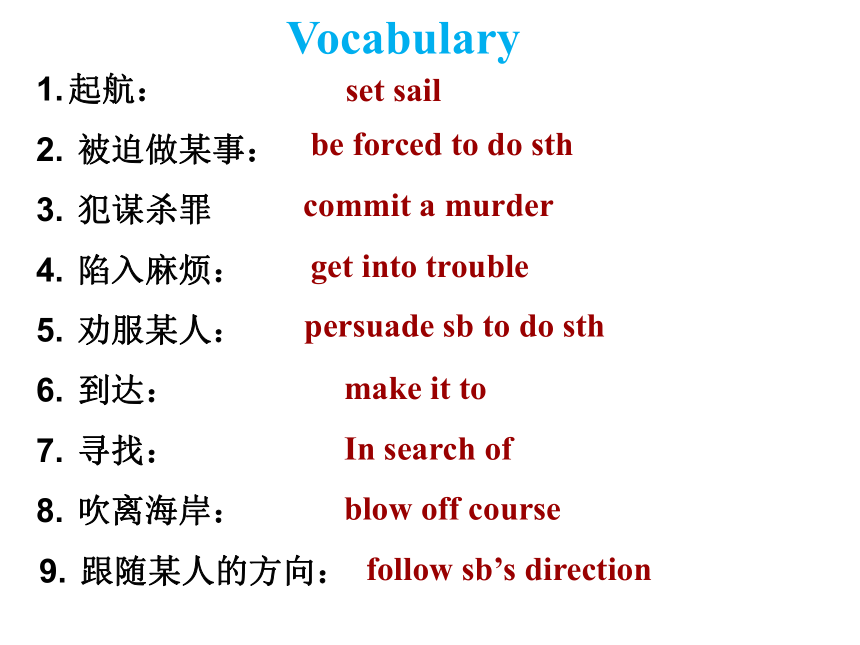
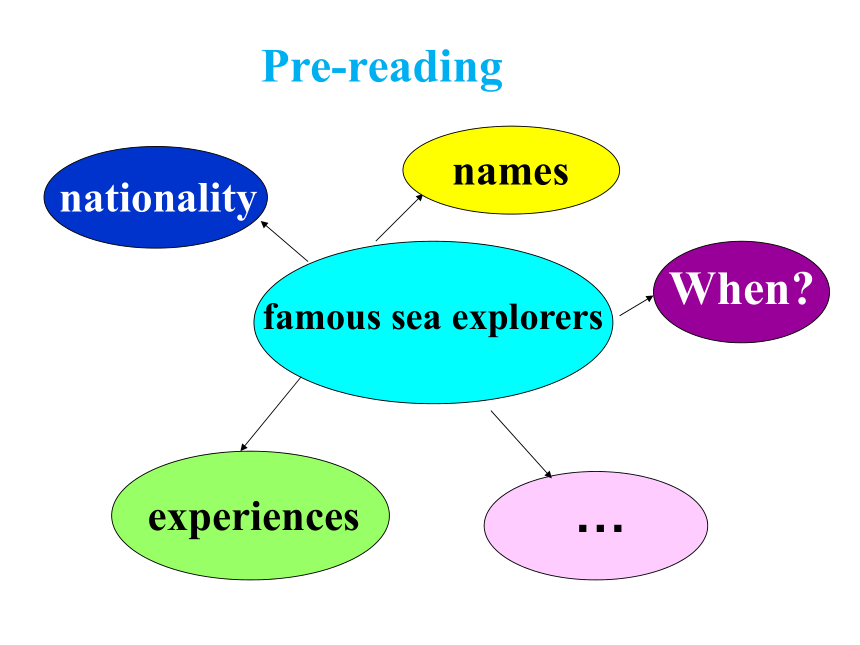
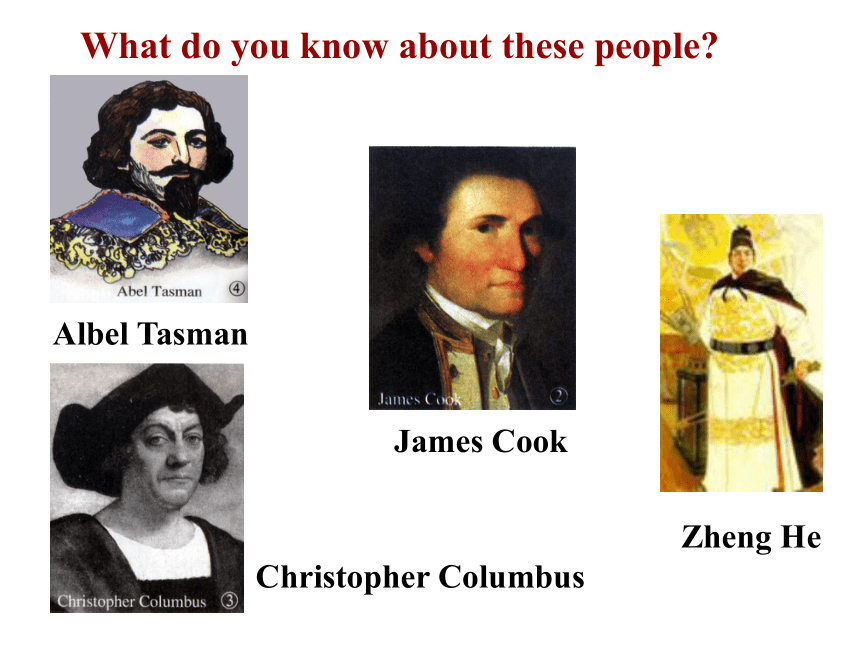
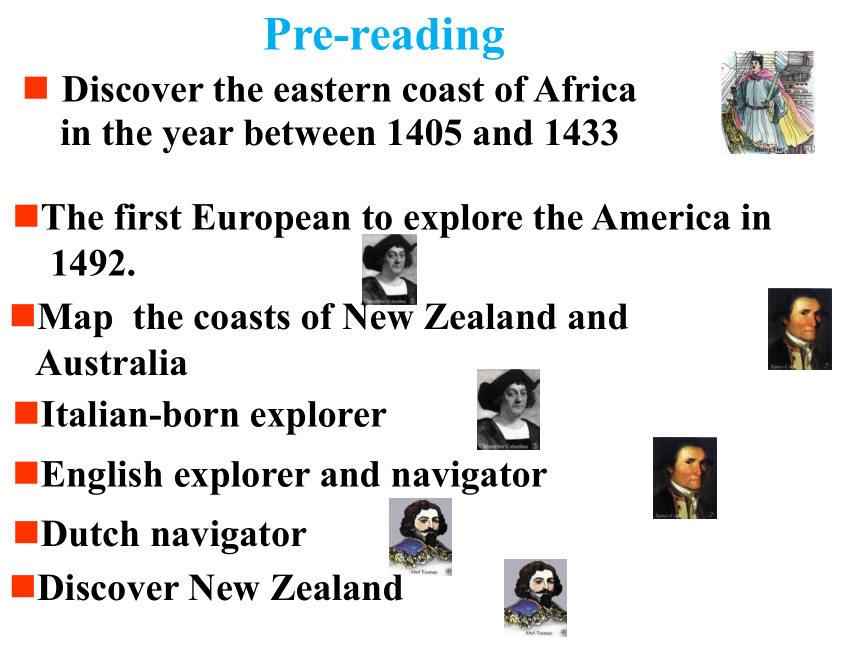
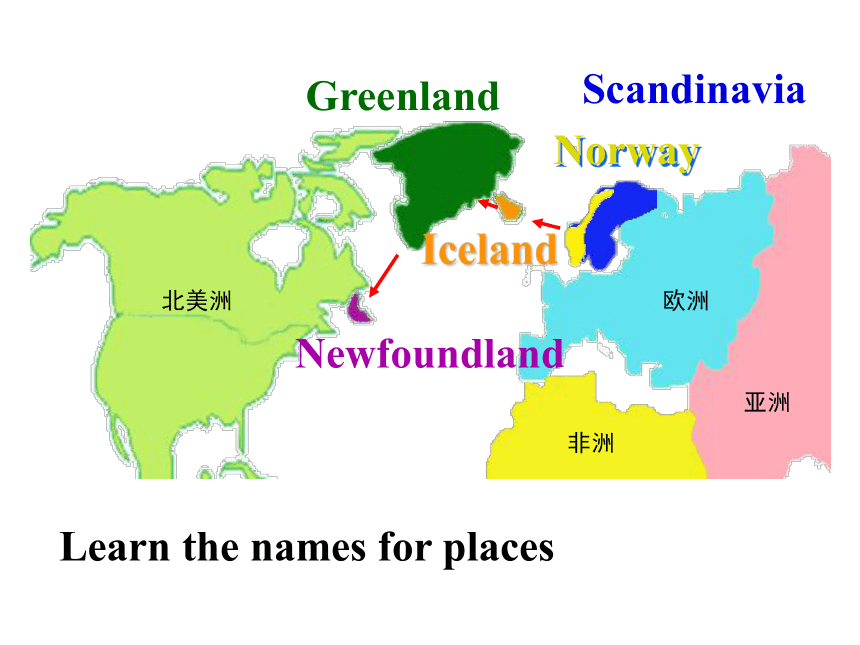

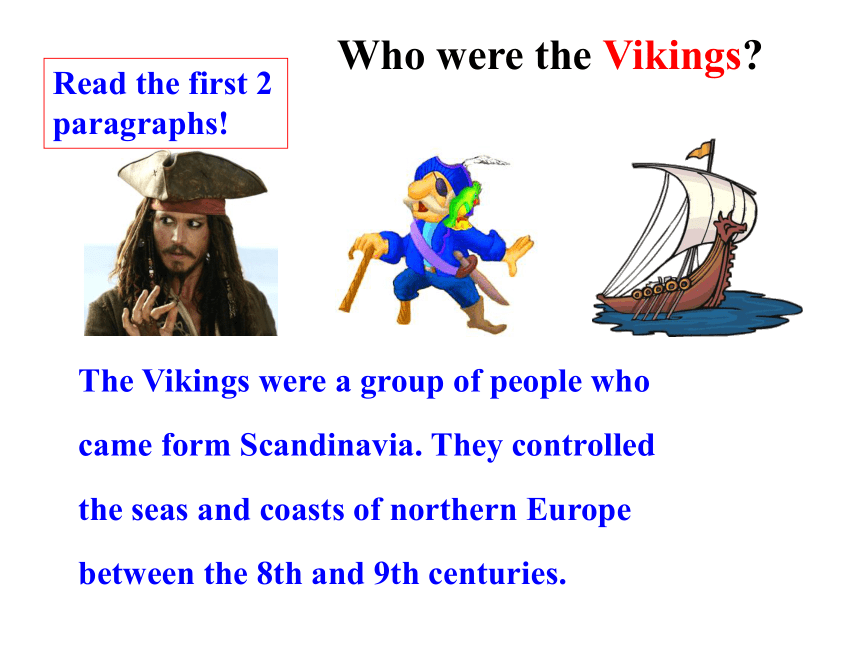
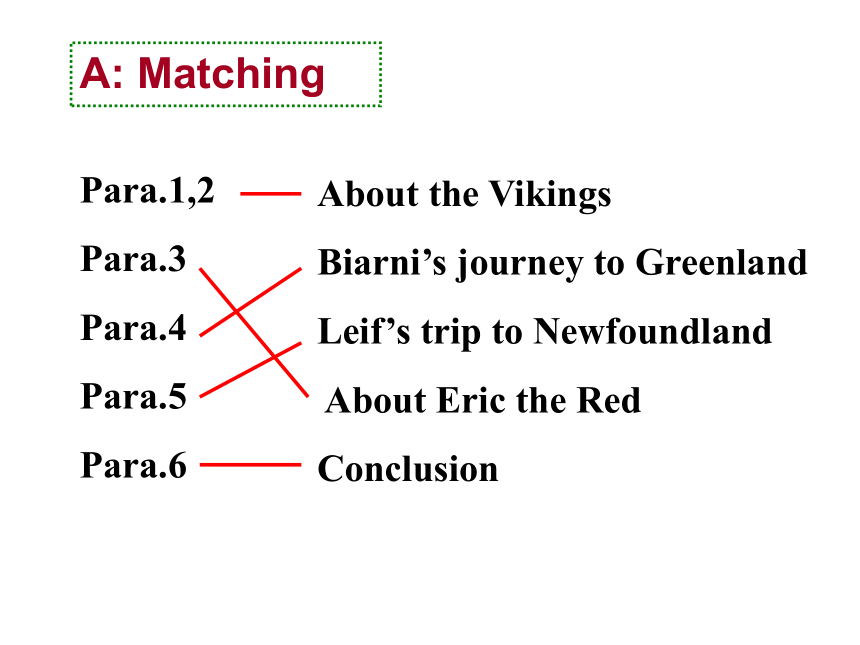

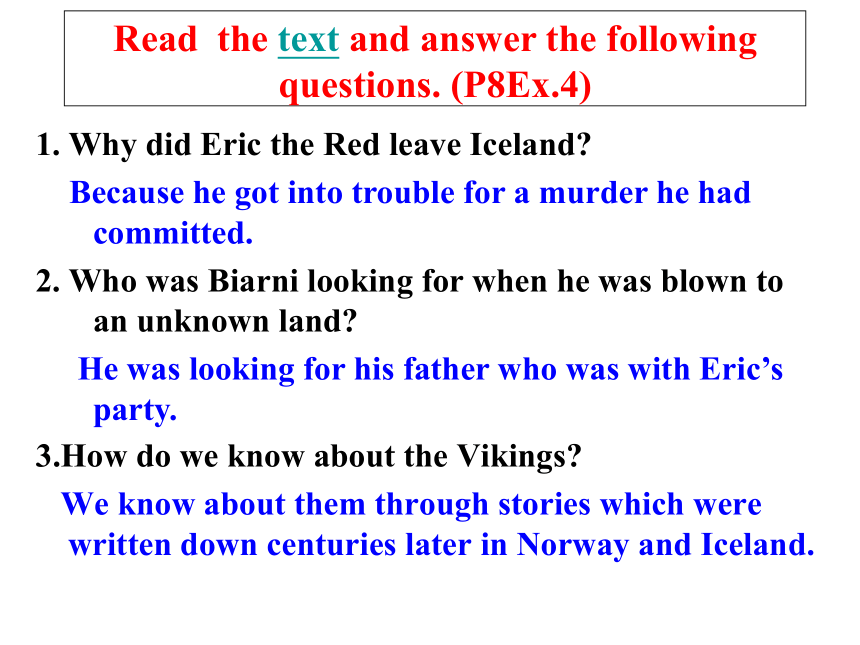
文档简介
课件69张PPT。 北师大版必修3Lesson 1
The Spirit of ExplorersUnit 7 The SeaObjectives In today’s class, we are going to : get to know the new words in the context.
obtain specific information about early sea exploration.
talk about the Viking voyages.Vocabulary起航:
被迫做某事:
犯谋杀罪
陷入麻烦:
劝服某人:
到达:
寻找:
吹离海岸:
跟随某人的方向:set sail be forced to do sth commit a murder get into troublepersuade sb to do sth make it to In search of blow off coursefollow sb’s directionfamous sea explorers namesexperiencesWhen?…nationalityPre-reading What do you know about these people?Albel TasmanChristopher ColumbusJames CookZheng He Discover the eastern coast of Africa
in the year between 1405 and 1433The first European to explore the America in
1492.Italian-born explorerMap the coasts of New Zealand and
AustraliaEnglish explorer and navigator
Dutch navigatorDiscover New ZealandPre-reading 北美洲欧洲亚洲非洲ScandinaviaIcelandNewfoundlandGreenlandNorwayLearn the names for places1. Which of the following people do you think arrived in America first?
a. Christopher Columbus
b. Ancient Romans
c. Chinese
d. VikingsDWhile-reading Who were the Vikings?The Vikings were a group of people who
came form Scandinavia. They controlled
the seas and coasts of northern Europe
between the 8th and 9th centuries.Read the first 2 paragraphs!About the Vikings
Biarni’s journey to Greenland
Leif’s trip to Newfoundland
About Eric the Red
Conclusion Para.1,2
Para.3
Para.4
Para.5
Para.6A: MatchingWhat’s the text mainly about?
The earliest Europeans to reach America.
The history of the Vikings
The sailing skills of the Vikings
Records written by the Vikings
What can we conclude from the passage?
Biarni was the son of Eric the Red
Leif reached the coast of present-day Africa
Columbus wasn’t the first European to set foot on America.
Eric the Red wrote down Leif’s deeds centuries later.Read the text and answer the following questions. (P8Ex.4)1. Why did Eric the Red leave Iceland?
Because he got into trouble for a murder he had committed.
2. Who was Biarni looking for when he was blown to an unknown land?
He was looking for his father who was with Eric’s party. 3.How do we know about the Vikings?
We know about them through stories which were written down centuries later in Norway and Iceland.
Read the passage and complete the table below about the Vikings’ three major discoveries. (P8 Ex.3)Eric the Red? not long after Eric the Red had landed in GreenlandBiarniunknown landblown off coursethe year 1002Newfound-land?Leif and Biarniplanned the tripPut the events in a correct orderA. Eric told people about Greenland.
B. Eric left Iceland and set sail west.
C. 10,000 Vikings lived in Iceland.
D. Leif discovered Newfoundland.
E. 14 ships arrived at Greenland.
F. Eric returned to Iceland.C—B—F—A—E—D In 982 AD
decide to set sail further westEric the Redaccording to … was forced to…because
…committed a murder…got into trouble
reached Greenland
return to Iceland
persuade … to go back with him to Greenland
Careful ReadingFill in the blanks with the detailed information.Part 1
__________ were the first Europeans to reach America . ( Para. 1)The VikingsPart 2 About the Vikings: ( Para. 2)
The Vikings ancestors came from: ________________________________
Between the 8th and 10th centuries: ________________________________
By around 900 AD:
________________________________
In 982 AD:
a._______________________________
b._______________________________Scandinaviacontrolled the seas and coasts of Northern Europechose many places in Northern Europe to liveEric the Red decided to set sail further west10,000 Vikings lived in IcelandEric the Red
(950?-1003 or 1004) was a Viking explorer who was the first European in Greenland. He led a group of colonists to Greenland in 986.Part 3 The Vikings’ four voyages to America ( Paras.3-5)
1) Eric the Red’s exploration ( Para. 3)Eric the Red was forced to leave Iceland because__________________________
________________________________
He returned to Iceland to____________
________________________________
He set sail once again with___________
________________________________ he had committed a murder
for which he got into trouble. persuade some
people to go with him to Greenland. 25 ships,
of which only 14 made it to Greenland.Biarni’s exploration (Para.4)When and why did Biarni set sail from Iceland ?
What happened to him during the voyage ?
Did he finally reach Greenland?Not long after Eric the Red had landed in Greenland, Biarni set sail in search of Eric’s party.He was blown off course and found himself in an unknown land.Yes, he did.Leif and Biarni’s exploration (Para.5)When was Leif planning the trip further west?
Where did they arrive ?In the year 1002.They sailed to what is believed to be the coast of present-day Canada, then sailed further south to Newfoundland.Part 4 How do we know about the stories? (Para. 6)The stories about the Vikings were written down centuries later in Norway and Iceland, which are the first records of Europeans sailing to the Americas.They achieved this long before Columbus ever set sail.
早在哥伦布启航前,他们就已经到达那里了。
1) long before “在……之前很久”
比较:
before long = soon “不久”
He will come back to see us before long.
他很快就会回来看我们。Language Points常见句型:
☆ It +be + 时间 + before…
“过了多久……才”
It was a long time before I fell asleep last
night.
昨晚我过了很久才睡着。
☆ It+be+ not +long +before …
“不久就……”
It won’t be long before we see each other.
我们不久就会见面的。2) set sail = start a sea journey (起航)
set out = set forth = set off (起程;出发;动身)
set out to do sth. 开始做某事
set about doing sth. 开始做某事,着手做某事(不用于被动语态)
The government must set about finding solutions to the pollution problem.
政府必须立即找出治理污染的办法。
They set out to repair the road.
他们开始维修公路了。2. According to the old stories of Iceland and Norway, Eric the Red was forced to leave Iceland because he had committed a murder, for which he got into trouble.
根据冰岛和挪威的传说,埃里克·雷德因一起谋杀而惹上麻烦并被迫离开冰岛。
according to … as stated or shown by
=based on 根据,依据
后面接短语,不能接句子。
The price changed according to the season.
价格根据季节变化。2) be forced to do sth. 被迫做某事
force sb. to do sth. 强迫某人做某事
The workers were forced to work at least
16 hours a day.
工人们被迫每天至少工作16个小时。
3) get into trouble
to put (oneself or someone else) into a
bad condition 陷入困境;陷入麻烦
Do not go to computer rooms, or you’ll
get into trouble.
别进入计算机房,否则你会惹麻烦的。 have trouble (in) doing something
做某事有困难
Did you have any trouble( in) finding the house?
你找到这所房子有困难吗?
Do you have trouble remembering names at parties?
在聚会上记住人的名字有困难吗?3. He persuaded some people to go back with him to Greenland.
他说服一些人和他一起回到了格陵兰岛。
persuade sb. to do sth.
说服、劝服某人做某事
He persuaded me to buy the house.
他说服我买了这房子。
He advised (tried to persuade) me to buy the house, but I didn’t.
他建议我买这房子,却没有把我说服。[常用搭配]
persuade sb. into doing sth.
= talk sb. into doing sth.
说服某人做某事
persuade sb. not to do sth.
= persuade sb. out of doing sth.
= talk sb. out of doing sth.
说服某人不要做某事
persuade sb of sth.
使某人相信某事He persuaded me into majoring in physics.
他说服我主修物理。
2) I persuaded her not to go hiking with him.
= I persuaded her out of going hiking with him.
我说服她不要和他去跋涉旅行。
3) How can you persuade them of the advantages of solar cars?
你怎样才能使他们相信太阳能汽车的好处呢? 4. a man called Biarni set sail from Iceland in search of Eric’s party.
in search of 寻找 …
The boys went out in search of something to eat.
这个男孩出去找些吃的东西。
search for 到处寻找
I must search for that lost money.
我必须寻找我丢失的钱。 search somebody 搜身
The police searched the prisoner to see if he had a gun.
警察搜了这个犯人的身, 看他是否带枪。
search someplace 搜某地
They searched every room in the house but found nothing.
他们搜了这所房子的每一个房间, 但什么也没找到。 5. voyage, journey, tour, travel 和 trip
voyage指水陆或空中长距离的航行;
journey指到某一目的地的旅行,往往指距离较远,多指陆地旅行;tour指周游,往往指绕行后又重回出发点的旅行;travel泛指旅行,多用于长途旅行;trip多指短途旅行。
[即时演练]
Fill in the blanks with voyage, journey, tour, travel or trip.1) The ________ from America to France used to take two months.
2) How did you enjoy your ________ in Europe?
3) I go to work by train, and the ____________ takes half an hour.
4) He made a five-month _______ of India and the Far East.
5) He took us on a _______ of his new house.voyagetraveltrip/journeytourtour6) The ________ across the sea was smooth.
7) She had been away on a long ___________.
8) I don’t believe we’ll be able to afford any _______.
9) Will you please bring back some sugar on your next ________ to the kitchen?
10) _________ were arranged for the foreign visitors to see the Great Wall.voyagetrip/journeytraveljourneyTours7. Read these sentences from the text and in pairs, work out which word introduces a relative clause and what it refers to.
a. By around 900 AD, there were many places in Northern Europe where the Vikings chose to live.
b. Eric reached Greenland and discovered that people could live in the place where he landed. Grammar Relative Clauses (II)Relative clauses with where, when and why
●Relative adverbs where and when can be used to give information about places and time.
● After the word reason, we can use why in relative clauses.1) This is the place ______ I lost my purse.
2) Marco Polo traveled in China, ______ there were inventions and developments at that time.
3) She still remembers the day _____ Bill first walked into her office.
4) Do you know the reason ______ he’s so angry with me?wherewhenwhy8. Fill in the blanks with where, when and why.whereRelative clauses with prepositions + which/whom
● Relative pronouns can be used as the objects of prepositions. Usually we use prepositions before which and whom, that is, prepositions + which/whom
For example:
1) This is the book for which he is looking.
2) He is the teacher with whom I discussed my project.● We choose prepositions either according to the noun or pronoun it defines or to the related verb in the clause.
For example:
1) The train on which I’m travelling is for Shanghai.
2) This is the professor from whom I’ve learned a lot.
3) She’s doing an important project about which I know little.(on the train)(learn from)(know about)● But, in everyday English, it is more usual to put the preposition at the end of the clause and to leave out the relative pronoun which, whom.
For example:
The train I’m travelling on is for Shanghai.= The train which/ that I’m travelling on is for Shanghai.2) This is the professor I’ve learned a lot from.
3) She’s doing an important project I know little about.
4) Have you seen the telescope I studied the skies with?= This is the professor whom/that I’ve learned a lot from.= She’s doing an important project about which I know little. = Have you seen the telescope with which I studied the skies.定语从句
在英语中,修饰名词或代词的句子叫定语从句。例:
The girl who is behind the tree is Kate.
That is the bike which my father bought for me.先行词:被定语从句修饰的词叫先行词。
关系词:引导定语从句的词叫关系词。
关系词有关系代词和关系副词。
关系代词有that, which, who, whom, whose, as等;关系副词有where, when, why等。关系词常有3个作用:
1.引导定语从句。
2. 代替先行词。
3. 在定语从句中担当一个成分。 关系副词和关系代词一样,在复合句中引导定语从句,其作用有:
1) 在从句中代替先行词;
2) 在句中作状语;
3) 连接作用,把两个句子连接成为一个带有定语从句的 复合句。 关系副词有三种:
where: 在从句中作地点状语,指代地点 (on / in / at … which)
when: 在从句中作时间状语,指代时间 (on / in … which)
why: 在从句中作原因状语,指代原因 (the reason why) The hotel where we stayed wasn’t clean.
=The hotel at which we stayed wasn’t clean.
=The hotel which we stayed at wasn’t clean.
=The hotel (关系词略) we stayed at wasn’t clean.I’ll never forget the day when I joined the League.
= I’ll never forget the day on which I joined the League.The reason why / for which he refused the invitation is not clear.介词+关系词引导定语从句?
1)介词后面的关系词不能省略。
2)that前不能有介词。
3) 某些在从句中充当时间、地点或原因状语的“介词+关系词”结构,可以同关系副词when、 where和why互换。1. This is the house in which I lived two years ago.
=This is the house where I lived two years ago.
2. Do you remember the day on which you joined our club?
=Do you remember the day when you joined our club? 3. Does this road lead to the village in which the famous scientist once lived and worked? (in which = where)
4. I will never forget the day on which I joined the youth league. (on which = when)5. Here comes the kind professor to whom we often turn for help. (turn to sb. for help)
6. Who is the young woman with whom our headmaster is shaking hands? (shake hands with sb.)
7. Please tell me the reason why you missed the plane.9. Join the pairs of sentences using
relative pronouns.
I have five balloons. Three of them are yellow.
David is my friend. I often play tennis with him.I have five balloons, of which three are yellow.David is my friend, with whom I often play tennis.3) He has twenty books. Only two of them
are interesting.
4) Mr. Johnson apologised for the mistake. We complained to him.He has twenty books, of which only two are interesting.Mr. Johnson, to whom we complained, apologised for the mistake. Mr. Johnson, whom/who we complained to, apologised for the mistake. 5) The Antarctic is covered with snow and ice all year round. Men know little about it.The Antarctic, about which men know little, is covered with snow and ice all year round. The Antarctic, which men know little about, is covered with snow and ice all year round. The shop, from which we bought the air-conditioner, is not far from my house, The shop, which we bought the air-conditioner from, is not far from my house.The shop, where we bought the air-conditioner, is not far from my house, 6) The shop is not far from my house. We bought the air-conditioner from it.7) You’d better tell her the name of the book. She can find information about the project there.You’d better tell her the name of the book, in which she can find information about the project.You’d better tell her the name of the book, where he can find information about the project.8) They have just started their trip to Tibet. They prepared for it for about a month.They have just started their trip to Tibet, which they prepared for about a month.They have just started their trip to Tibet, for which they prepared for about a month.Additional Exercises1.The place _______interested me most
was the Children’s Palace.
A. Which B. where C. what D. in which
2. Do you know the man _______?
whom I spoke B. to who spoke
C. I spoke to D. that I spoke
3.This is the hotel _______last month.
A. which they stayed B. that they stayed
C. where they stayed at
D. where they stayedACD4. Do you know the year ______the Chinese
Communist Party was founded?
A. which B. that C. when D. on which
5.That is the day ______I’ll never forget.
A. which B. on which C. in which D. whenCAStephen Hawking believes that earth is unlikely to be the only planet___ life has developed gradually.
A. That B. where C. which D. whose
2. I’ve become good friends with several of the students in my school ___ I met in the English speech contest last year.
A. who B. where C. when D. which BA3. ( ) The days are gone ________ physical strength was all you needed to make a living.
A. when B. that
C. where D. whichA4. ( ) A bank is the place ____they lend you an umbrella in fair weather and ask for it back when it begins to rain.
A. when B. that
C. where D. there C5.( ) Sales director is a position _____ communication ability is just as important as sales themselves.
A. which B. that
C. when D. whereD6. ( ) We live in an age _____ more information is available with greater ease than ever before.
A. why B. when
C. to whom D. on whichB7. ( ) Care of the soul is a gradual process _____ even the small details of life should be considered.
A. what B. in what
C. which D. in whichD8.( ) In our class there are 46 students, _____ half wear glasses.
A. in whom B. in them
C. of whom D. of themC9. The girl arranged to have piano lessons at the training centre with her sister ______ she would stay for an hour.
A. where B. who C. which D. what
10. That’s the new machine ______ parts are too small to be seen.
A. that B. which C. whose D. WhatACQuotations Man cannot discover new oceans unless he has the courage to lose sight of the shore.
---André Gide
安德烈·纪德
法国著名作家 Thank you!
The Spirit of ExplorersUnit 7 The SeaObjectives In today’s class, we are going to : get to know the new words in the context.
obtain specific information about early sea exploration.
talk about the Viking voyages.Vocabulary起航:
被迫做某事:
犯谋杀罪
陷入麻烦:
劝服某人:
到达:
寻找:
吹离海岸:
跟随某人的方向:set sail be forced to do sth commit a murder get into troublepersuade sb to do sth make it to In search of blow off coursefollow sb’s directionfamous sea explorers namesexperiencesWhen?…nationalityPre-reading What do you know about these people?Albel TasmanChristopher ColumbusJames CookZheng He Discover the eastern coast of Africa
in the year between 1405 and 1433The first European to explore the America in
1492.Italian-born explorerMap the coasts of New Zealand and
AustraliaEnglish explorer and navigator
Dutch navigatorDiscover New ZealandPre-reading 北美洲欧洲亚洲非洲ScandinaviaIcelandNewfoundlandGreenlandNorwayLearn the names for places1. Which of the following people do you think arrived in America first?
a. Christopher Columbus
b. Ancient Romans
c. Chinese
d. VikingsDWhile-reading Who were the Vikings?The Vikings were a group of people who
came form Scandinavia. They controlled
the seas and coasts of northern Europe
between the 8th and 9th centuries.Read the first 2 paragraphs!About the Vikings
Biarni’s journey to Greenland
Leif’s trip to Newfoundland
About Eric the Red
Conclusion Para.1,2
Para.3
Para.4
Para.5
Para.6A: MatchingWhat’s the text mainly about?
The earliest Europeans to reach America.
The history of the Vikings
The sailing skills of the Vikings
Records written by the Vikings
What can we conclude from the passage?
Biarni was the son of Eric the Red
Leif reached the coast of present-day Africa
Columbus wasn’t the first European to set foot on America.
Eric the Red wrote down Leif’s deeds centuries later.Read the text and answer the following questions. (P8Ex.4)1. Why did Eric the Red leave Iceland?
Because he got into trouble for a murder he had committed.
2. Who was Biarni looking for when he was blown to an unknown land?
He was looking for his father who was with Eric’s party. 3.How do we know about the Vikings?
We know about them through stories which were written down centuries later in Norway and Iceland.
Read the passage and complete the table below about the Vikings’ three major discoveries. (P8 Ex.3)Eric the Red? not long after Eric the Red had landed in GreenlandBiarniunknown landblown off coursethe year 1002Newfound-land?Leif and Biarniplanned the tripPut the events in a correct orderA. Eric told people about Greenland.
B. Eric left Iceland and set sail west.
C. 10,000 Vikings lived in Iceland.
D. Leif discovered Newfoundland.
E. 14 ships arrived at Greenland.
F. Eric returned to Iceland.C—B—F—A—E—D In 982 AD
decide to set sail further westEric the Redaccording to … was forced to…because
…committed a murder…got into trouble
reached Greenland
return to Iceland
persuade … to go back with him to Greenland
Careful ReadingFill in the blanks with the detailed information.Part 1
__________ were the first Europeans to reach America . ( Para. 1)The VikingsPart 2 About the Vikings: ( Para. 2)
The Vikings ancestors came from: ________________________________
Between the 8th and 10th centuries: ________________________________
By around 900 AD:
________________________________
In 982 AD:
a._______________________________
b._______________________________Scandinaviacontrolled the seas and coasts of Northern Europechose many places in Northern Europe to liveEric the Red decided to set sail further west10,000 Vikings lived in IcelandEric the Red
(950?-1003 or 1004) was a Viking explorer who was the first European in Greenland. He led a group of colonists to Greenland in 986.Part 3 The Vikings’ four voyages to America ( Paras.3-5)
1) Eric the Red’s exploration ( Para. 3)Eric the Red was forced to leave Iceland because__________________________
________________________________
He returned to Iceland to____________
________________________________
He set sail once again with___________
________________________________ he had committed a murder
for which he got into trouble. persuade some
people to go with him to Greenland. 25 ships,
of which only 14 made it to Greenland.Biarni’s exploration (Para.4)When and why did Biarni set sail from Iceland ?
What happened to him during the voyage ?
Did he finally reach Greenland?Not long after Eric the Red had landed in Greenland, Biarni set sail in search of Eric’s party.He was blown off course and found himself in an unknown land.Yes, he did.Leif and Biarni’s exploration (Para.5)When was Leif planning the trip further west?
Where did they arrive ?In the year 1002.They sailed to what is believed to be the coast of present-day Canada, then sailed further south to Newfoundland.Part 4 How do we know about the stories? (Para. 6)The stories about the Vikings were written down centuries later in Norway and Iceland, which are the first records of Europeans sailing to the Americas.They achieved this long before Columbus ever set sail.
早在哥伦布启航前,他们就已经到达那里了。
1) long before “在……之前很久”
比较:
before long = soon “不久”
He will come back to see us before long.
他很快就会回来看我们。Language Points常见句型:
☆ It +be + 时间 + before…
“过了多久……才”
It was a long time before I fell asleep last
night.
昨晚我过了很久才睡着。
☆ It+be+ not +long +before …
“不久就……”
It won’t be long before we see each other.
我们不久就会见面的。2) set sail = start a sea journey (起航)
set out = set forth = set off (起程;出发;动身)
set out to do sth. 开始做某事
set about doing sth. 开始做某事,着手做某事(不用于被动语态)
The government must set about finding solutions to the pollution problem.
政府必须立即找出治理污染的办法。
They set out to repair the road.
他们开始维修公路了。2. According to the old stories of Iceland and Norway, Eric the Red was forced to leave Iceland because he had committed a murder, for which he got into trouble.
根据冰岛和挪威的传说,埃里克·雷德因一起谋杀而惹上麻烦并被迫离开冰岛。
according to … as stated or shown by
=based on 根据,依据
后面接短语,不能接句子。
The price changed according to the season.
价格根据季节变化。2) be forced to do sth. 被迫做某事
force sb. to do sth. 强迫某人做某事
The workers were forced to work at least
16 hours a day.
工人们被迫每天至少工作16个小时。
3) get into trouble
to put (oneself or someone else) into a
bad condition 陷入困境;陷入麻烦
Do not go to computer rooms, or you’ll
get into trouble.
别进入计算机房,否则你会惹麻烦的。 have trouble (in) doing something
做某事有困难
Did you have any trouble( in) finding the house?
你找到这所房子有困难吗?
Do you have trouble remembering names at parties?
在聚会上记住人的名字有困难吗?3. He persuaded some people to go back with him to Greenland.
他说服一些人和他一起回到了格陵兰岛。
persuade sb. to do sth.
说服、劝服某人做某事
He persuaded me to buy the house.
他说服我买了这房子。
He advised (tried to persuade) me to buy the house, but I didn’t.
他建议我买这房子,却没有把我说服。[常用搭配]
persuade sb. into doing sth.
= talk sb. into doing sth.
说服某人做某事
persuade sb. not to do sth.
= persuade sb. out of doing sth.
= talk sb. out of doing sth.
说服某人不要做某事
persuade sb of sth.
使某人相信某事He persuaded me into majoring in physics.
他说服我主修物理。
2) I persuaded her not to go hiking with him.
= I persuaded her out of going hiking with him.
我说服她不要和他去跋涉旅行。
3) How can you persuade them of the advantages of solar cars?
你怎样才能使他们相信太阳能汽车的好处呢? 4. a man called Biarni set sail from Iceland in search of Eric’s party.
in search of 寻找 …
The boys went out in search of something to eat.
这个男孩出去找些吃的东西。
search for 到处寻找
I must search for that lost money.
我必须寻找我丢失的钱。 search somebody 搜身
The police searched the prisoner to see if he had a gun.
警察搜了这个犯人的身, 看他是否带枪。
search someplace 搜某地
They searched every room in the house but found nothing.
他们搜了这所房子的每一个房间, 但什么也没找到。 5. voyage, journey, tour, travel 和 trip
voyage指水陆或空中长距离的航行;
journey指到某一目的地的旅行,往往指距离较远,多指陆地旅行;tour指周游,往往指绕行后又重回出发点的旅行;travel泛指旅行,多用于长途旅行;trip多指短途旅行。
[即时演练]
Fill in the blanks with voyage, journey, tour, travel or trip.1) The ________ from America to France used to take two months.
2) How did you enjoy your ________ in Europe?
3) I go to work by train, and the ____________ takes half an hour.
4) He made a five-month _______ of India and the Far East.
5) He took us on a _______ of his new house.voyagetraveltrip/journeytourtour6) The ________ across the sea was smooth.
7) She had been away on a long ___________.
8) I don’t believe we’ll be able to afford any _______.
9) Will you please bring back some sugar on your next ________ to the kitchen?
10) _________ were arranged for the foreign visitors to see the Great Wall.voyagetrip/journeytraveljourneyTours7. Read these sentences from the text and in pairs, work out which word introduces a relative clause and what it refers to.
a. By around 900 AD, there were many places in Northern Europe where the Vikings chose to live.
b. Eric reached Greenland and discovered that people could live in the place where he landed. Grammar Relative Clauses (II)Relative clauses with where, when and why
●Relative adverbs where and when can be used to give information about places and time.
● After the word reason, we can use why in relative clauses.1) This is the place ______ I lost my purse.
2) Marco Polo traveled in China, ______ there were inventions and developments at that time.
3) She still remembers the day _____ Bill first walked into her office.
4) Do you know the reason ______ he’s so angry with me?wherewhenwhy8. Fill in the blanks with where, when and why.whereRelative clauses with prepositions + which/whom
● Relative pronouns can be used as the objects of prepositions. Usually we use prepositions before which and whom, that is, prepositions + which/whom
For example:
1) This is the book for which he is looking.
2) He is the teacher with whom I discussed my project.● We choose prepositions either according to the noun or pronoun it defines or to the related verb in the clause.
For example:
1) The train on which I’m travelling is for Shanghai.
2) This is the professor from whom I’ve learned a lot.
3) She’s doing an important project about which I know little.(on the train)(learn from)(know about)● But, in everyday English, it is more usual to put the preposition at the end of the clause and to leave out the relative pronoun which, whom.
For example:
The train I’m travelling on is for Shanghai.= The train which/ that I’m travelling on is for Shanghai.2) This is the professor I’ve learned a lot from.
3) She’s doing an important project I know little about.
4) Have you seen the telescope I studied the skies with?= This is the professor whom/that I’ve learned a lot from.= She’s doing an important project about which I know little. = Have you seen the telescope with which I studied the skies.定语从句
在英语中,修饰名词或代词的句子叫定语从句。例:
The girl who is behind the tree is Kate.
That is the bike which my father bought for me.先行词:被定语从句修饰的词叫先行词。
关系词:引导定语从句的词叫关系词。
关系词有关系代词和关系副词。
关系代词有that, which, who, whom, whose, as等;关系副词有where, when, why等。关系词常有3个作用:
1.引导定语从句。
2. 代替先行词。
3. 在定语从句中担当一个成分。 关系副词和关系代词一样,在复合句中引导定语从句,其作用有:
1) 在从句中代替先行词;
2) 在句中作状语;
3) 连接作用,把两个句子连接成为一个带有定语从句的 复合句。 关系副词有三种:
where: 在从句中作地点状语,指代地点 (on / in / at … which)
when: 在从句中作时间状语,指代时间 (on / in … which)
why: 在从句中作原因状语,指代原因 (the reason why) The hotel where we stayed wasn’t clean.
=The hotel at which we stayed wasn’t clean.
=The hotel which we stayed at wasn’t clean.
=The hotel (关系词略) we stayed at wasn’t clean.I’ll never forget the day when I joined the League.
= I’ll never forget the day on which I joined the League.The reason why / for which he refused the invitation is not clear.介词+关系词引导定语从句?
1)介词后面的关系词不能省略。
2)that前不能有介词。
3) 某些在从句中充当时间、地点或原因状语的“介词+关系词”结构,可以同关系副词when、 where和why互换。1. This is the house in which I lived two years ago.
=This is the house where I lived two years ago.
2. Do you remember the day on which you joined our club?
=Do you remember the day when you joined our club? 3. Does this road lead to the village in which the famous scientist once lived and worked? (in which = where)
4. I will never forget the day on which I joined the youth league. (on which = when)5. Here comes the kind professor to whom we often turn for help. (turn to sb. for help)
6. Who is the young woman with whom our headmaster is shaking hands? (shake hands with sb.)
7. Please tell me the reason why you missed the plane.9. Join the pairs of sentences using
relative pronouns.
I have five balloons. Three of them are yellow.
David is my friend. I often play tennis with him.I have five balloons, of which three are yellow.David is my friend, with whom I often play tennis.3) He has twenty books. Only two of them
are interesting.
4) Mr. Johnson apologised for the mistake. We complained to him.He has twenty books, of which only two are interesting.Mr. Johnson, to whom we complained, apologised for the mistake. Mr. Johnson, whom/who we complained to, apologised for the mistake. 5) The Antarctic is covered with snow and ice all year round. Men know little about it.The Antarctic, about which men know little, is covered with snow and ice all year round. The Antarctic, which men know little about, is covered with snow and ice all year round. The shop, from which we bought the air-conditioner, is not far from my house, The shop, which we bought the air-conditioner from, is not far from my house.The shop, where we bought the air-conditioner, is not far from my house, 6) The shop is not far from my house. We bought the air-conditioner from it.7) You’d better tell her the name of the book. She can find information about the project there.You’d better tell her the name of the book, in which she can find information about the project.You’d better tell her the name of the book, where he can find information about the project.8) They have just started their trip to Tibet. They prepared for it for about a month.They have just started their trip to Tibet, which they prepared for about a month.They have just started their trip to Tibet, for which they prepared for about a month.Additional Exercises1.The place _______interested me most
was the Children’s Palace.
A. Which B. where C. what D. in which
2. Do you know the man _______?
whom I spoke B. to who spoke
C. I spoke to D. that I spoke
3.This is the hotel _______last month.
A. which they stayed B. that they stayed
C. where they stayed at
D. where they stayedACD4. Do you know the year ______the Chinese
Communist Party was founded?
A. which B. that C. when D. on which
5.That is the day ______I’ll never forget.
A. which B. on which C. in which D. whenCAStephen Hawking believes that earth is unlikely to be the only planet___ life has developed gradually.
A. That B. where C. which D. whose
2. I’ve become good friends with several of the students in my school ___ I met in the English speech contest last year.
A. who B. where C. when D. which BA3. ( ) The days are gone ________ physical strength was all you needed to make a living.
A. when B. that
C. where D. whichA4. ( ) A bank is the place ____they lend you an umbrella in fair weather and ask for it back when it begins to rain.
A. when B. that
C. where D. there C5.( ) Sales director is a position _____ communication ability is just as important as sales themselves.
A. which B. that
C. when D. whereD6. ( ) We live in an age _____ more information is available with greater ease than ever before.
A. why B. when
C. to whom D. on whichB7. ( ) Care of the soul is a gradual process _____ even the small details of life should be considered.
A. what B. in what
C. which D. in whichD8.( ) In our class there are 46 students, _____ half wear glasses.
A. in whom B. in them
C. of whom D. of themC9. The girl arranged to have piano lessons at the training centre with her sister ______ she would stay for an hour.
A. where B. who C. which D. what
10. That’s the new machine ______ parts are too small to be seen.
A. that B. which C. whose D. WhatACQuotations Man cannot discover new oceans unless he has the courage to lose sight of the shore.
---André Gide
安德烈·纪德
法国著名作家 Thank you!
